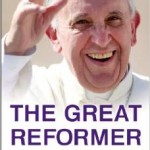“The great danger in today’s world, pervaded as it is by consumerism, is the desolation and anguish born of a complacent yet covetous heart, the feverish pursuit of frivolous pleasures, and a blunted conscience. Whenever our interior life becomes caught up in its own interests and concerns, there is no longer room for others, no place for the poor. Whenever our interior life becomes caught up in its own interests and concerns, there is no longer room for others, no place for the poor. God’s voice is no longer heard, the quiet joy of his love is no longer felt, and the desire to do good fades. This is a very real danger for believers too. Many fall prey to it, and end up resentful, angry and listless. That is no way to live a dignified and fulfilled life; it is not God’s will for us, nor is it the life in the Spirit which has its source in the heart of the risen Christ.”
– Pope Francis, Evangelii Gaudium

I haven’t written about the pope’s exhortation, yet, because I read a few lines and end up writing 300-500 words in personal notes.
At this rate, I’ll never finish.
UPDATE:
Ross Douthat has written the best piece I’ve yet read on the papal exhortation and the “Francis is a Commie” reactions of some:
It’s true that there is far more continuity between Francis and Benedict than media accounts suggest. But the new pope clearly intends to foreground the church’s social teaching in new ways, and probably seeks roughly the press coverage he’s getting.
It’s also true that Francis’s framework is pastoral rather than political. But his plain language tilts leftward in ways that no serious reader can deny.
Finally, it’s true that there is no Catholic position on, say, the correct marginal tax rate, and that Catholics are not obliged to heed the pope when he suggests that global inequality is increasing when the statistical evidence suggests otherwise.
But the church’s social teaching is no less an official teaching for allowing room for disagreement on its policy implications. And for Catholics who pride themselves on fidelity to Rome, the burden is on them — on us — to explain why a worldview that inspires left-leaning papal rhetoric also allows for right-of-center conclusions.
That explanation rests, I think, on three ideas.
Read it all to catch those ideas, and don’t miss Douthat’s own faith-filled exhortation at the end. It’s the best piece you’ll read today, or perhaps for several days to come, on the subject.













